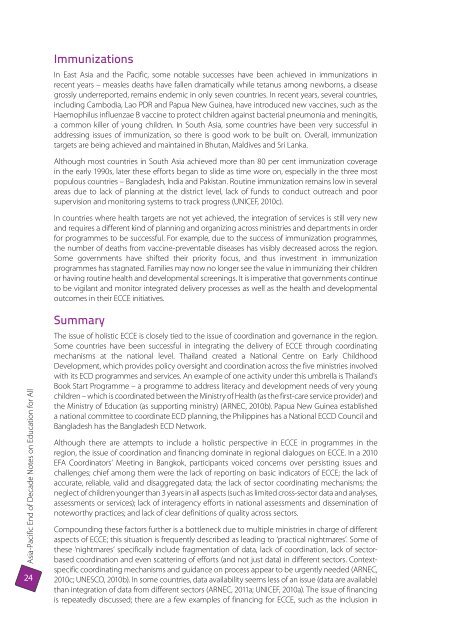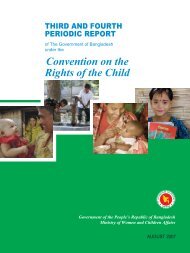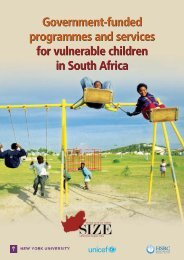EFA Goal 1: Early childhood care and education; Asia ... - Unicef
EFA Goal 1: Early childhood care and education; Asia ... - Unicef
EFA Goal 1: Early childhood care and education; Asia ... - Unicef
Create successful ePaper yourself
Turn your PDF publications into a flip-book with our unique Google optimized e-Paper software.
Immunizations<br />
In East <strong>Asia</strong> <strong>and</strong> the Pacific, some notable successes have been achieved in immunizations in<br />
recent years – measles deaths have fallen dramatically while tetanus among newborns, a disease<br />
grossly underreported, remains endemic in only seven countries. In recent years, several countries,<br />
including Cambodia, Lao PDR <strong>and</strong> Papua New Guinea, have introduced new vaccines, such as the<br />
Haemophilus influenzae B vaccine to protect children against bacterial pneumonia <strong>and</strong> meningitis,<br />
a common killer of young children. In South <strong>Asia</strong>, some countries have been very successful in<br />
addressing issues of immunization, so there is good work to be built on. Overall, immunization<br />
targets are being achieved <strong>and</strong> maintained in Bhutan, Maldives <strong>and</strong> Sri Lanka.<br />
Although most countries in South <strong>Asia</strong> achieved more than 80 per cent immunization coverage<br />
in the early 1990s, later these efforts began to slide as time wore on, especially in the three most<br />
populous countries – Bangladesh, India <strong>and</strong> Pakistan. Routine immunization remains low in several<br />
areas due to lack of planning at the district level, lack of funds to conduct outreach <strong>and</strong> poor<br />
supervision <strong>and</strong> monitoring systems to track progress (UNICEF, 2010c).<br />
In countries where health targets are not yet achieved, the integration of services is still very new<br />
<strong>and</strong> requires a different kind of planning <strong>and</strong> organizing across ministries <strong>and</strong> departments in order<br />
for programmes to be successful. For example, due to the success of immunization programmes,<br />
the number of deaths from vaccine-preventable diseases has visibly decreased across the region.<br />
Some governments have shifted their priority focus, <strong>and</strong> thus investment in immunization<br />
programmes has stagnated. Families may now no longer see the value in immunizing their children<br />
or having routine health <strong>and</strong> developmental screenings. It is imperative that governments continue<br />
to be vigilant <strong>and</strong> monitor integrated delivery processes as well as the health <strong>and</strong> developmental<br />
outcomes in their ECCE initiatives.<br />
<strong>Asia</strong>-Pacific End of Decade Notes on Education for All<br />
24<br />
Summary<br />
The issue of holistic ECCE is closely tied to the issue of coordination <strong>and</strong> governance in the region.<br />
Some countries have been successful in integrating the delivery of ECCE through coordinating<br />
mechanisms at the national level. Thail<strong>and</strong> created a National Centre on <strong>Early</strong> Childhood<br />
Development, which provides policy oversight <strong>and</strong> coordination across the five ministries involved<br />
with its ECD programmes <strong>and</strong> services. An example of one activity under this umbrella is Thail<strong>and</strong>’s<br />
Book Start Programme – a programme to address literacy <strong>and</strong> development needs of very young<br />
children – which is coordinated between the Ministry of Health (as the first-<strong>care</strong> service provider) <strong>and</strong><br />
the Ministry of Education (as supporting ministry) (ARNEC, 2010b). Papua New Guinea established<br />
a national committee to coordinate ECD planning, the Philippines has a National ECCD Council <strong>and</strong><br />
Bangladesh has the Bangladesh ECD Network.<br />
Although there are attempts to include a holistic perspective in ECCE in programmes in the<br />
region, the issue of coordination <strong>and</strong> financing dominate in regional dialogues on ECCE. In a 2010<br />
<strong>EFA</strong> Coordinators’ Meeting in Bangkok, participants voiced concerns over persisting issues <strong>and</strong><br />
challenges; chief among them were the lack of reporting on basic indicators of ECCE; the lack of<br />
accurate, reliable, valid <strong>and</strong> disaggregated data; the lack of sector coordinating mechanisms; the<br />
neglect of children younger than 3 years in all aspects (such as limited cross-sector data <strong>and</strong> analyses,<br />
assessments or services); lack of interagency efforts in national assessments <strong>and</strong> dissemination of<br />
noteworthy practices; <strong>and</strong> lack of clear definitions of quality across sectors.<br />
Compounding these factors further is a bottleneck due to multiple ministries in charge of different<br />
aspects of ECCE; this situation is frequently described as leading to ‘practical nightmares’. Some of<br />
these ‘nightmares’ specifically include fragmentation of data, lack of coordination, lack of sectorbased<br />
coordination <strong>and</strong> even scattering of efforts (<strong>and</strong> not just data) in different sectors. Contextspecific<br />
coordinating mechanisms <strong>and</strong> guidance on process appear to be urgently needed (ARNEC,<br />
2010c; UNESCO, 2010b). In some countries, data availability seems less of an issue (data are available)<br />
than integration of data from different sectors (ARNEC, 2011a; UNICEF, 2010a). The issue of financing<br />
is repeatedly discussed; there are a few examples of financing for ECCE, such as the inclusion in

















